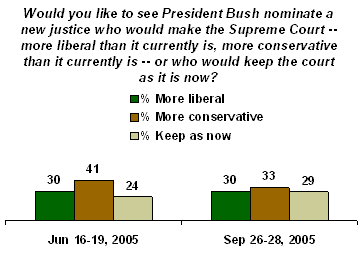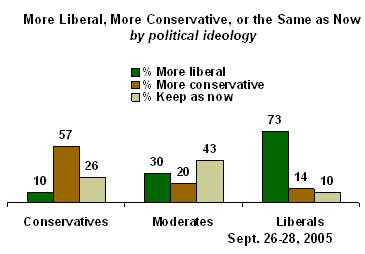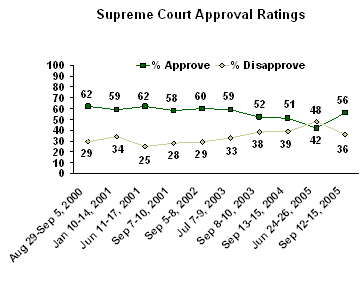GALLUP NEWS SERVICE
PRINCETON, NJ -- With John Roberts now confirmed as chief justice, George W. Bush prepares to announce a second nominee to the Supreme Court. A new CNN/USA Today/Gallup poll finds Americans closely divided as to whether that nominee should make the Supreme Court more conservative, more liberal, or not change the court's ideological makeup. While many have speculated that Bush may choose a woman or racial or ethnic minority to replace retiring Justice Sandra Day O'Connor, few Americans see this as an essential quality of the next nominee. The Supreme Court's recent job approval rating has recovered after taking a hit near the end of the court's last term.
Court Ideology
The Sept. 26-28 CNN/USA Today/Gallup poll finds 33% of Americans saying Bush should nominate a Supreme Court justice who would make the court more conservative, 30% who think it should be made more liberal, and 29% who say it should be kept the same as now.
There has been a shift since this summer. A June 16-19 poll, conducted shortly before O'Connor announced her retirement, found 41% of Americans favoring a more conservative court, with 30% preferring a more liberal court and 24% wanting no change.

As one would expect, most self-described conservatives (57%) want to see the court go in a more conservative direction, but an even higher percentage of liberals (73%) want to see it become more liberal. A plurality of moderates prefer to maintain the status quo, but more moderates prefer a more liberal (30%) to a more conservative (20%) court.

Court Diversity
Bush has hinted that the court's racial, ethnic, and gender diversity will be a consideration when he chooses the next nominee. That the new nominee would take O'Connor's seat may add pressure to choose a woman. Bush reportedly has long favored naming a Hispanic to the court. However, the poll finds that most Americans, 51%, say the next justice's race, ethnicity, or gender does not matter to them. Only 12% say it is "essential that the next justice is Hispanic, black, or a woman," while an additional 28% say it is "a good idea, but not essential."
A recent Newsweek poll shows that the public thinks diversity should be a consideration in the choice. The Sept. 8-9 Newsweek poll finds 66% saying Bush should strongly consider naming another woman to serve on the court, and 60% say he should strongly consider naming another black or a Hispanic to the court. But the Gallup data suggest that people do not view a female or minority nomination as a requirement.
In the new CNN/USA Today/Gallup poll, a randomly selected half of respondents were asked the general question about whether the next court nominee should be either black, Hispanic, or a woman. The other half was asked about each characteristic in isolation. In each case, a majority of Americans say the nominee's gender, race, or ethnicity does not matter to them.
- Fifty-five percent say it does not matter if the next justice is a woman, while 14% say it is essential the next justice is female, and 29% say it is a good idea, but not essential.
- Sixty-nine percent say it does not matter if the next justice is Hispanic; only 3% say it is essential and 23% say it is a good idea.
- Seventy-one percent say it does not matter if the next justice is black, 5% say it is essential, and 22% say it is a good idea.
In all cases, Democrats are more likely than Republicans to see these characteristics as either essential or desirable qualities in the next justice, while the vast majority of Republicans say none of these characteristics matters to them.
Supreme Court Approval
The vacancies that O'Connor's impending retirement and the death of former Chief Justice William Rehnquist created have attracted attention to the court. In general, most Americans give the Supreme Court a positive review overall -- according to a Sept. 12-15 Gallup Poll, 56% approve of the way it is handling its job, while 36% disapprove.
That is a dramatic improvement from as recently as this past summer. A June 24-26 CNN/USA Today/Gallup poll conducted near the end of the last term found just 42% of Americans approving and 48% disapproving of the court -- the most negative reading Gallup has measured since it began tracking approval in 2000. That June poll was conducted on the heels of the court's controversial decision permitting broader government power to seize privately held land.

Republicans (65%) are much more likely than independents (54%) or Democrats (47%) to approve of the Supreme Court's performance. In June, there were essentially no party differences -- 44% of Republicans, 42% of independents, and 40% of Democrats approved. The court's eminent domain decision was largely criticized by those who fear it gave too much power to government, a view typically held by Republicans. But apparently the possible effect of that decision on Republicans' (and to a lesser extent, independents') views of the court has faded.
Survey Methods
These results are based on telephone interviews with a randomly selected national sample of 1,007 adults, aged 18 and older, conducted Sept. 26-28, 2005. For results based on this sample, one can say with 95% confidence that the maximum error attributable to sampling and other random effects is ±3 percentage points. In addition to sampling error, question wording and practical difficulties in conducting surveys can introduce error or bias into the findings of public opinion polls.
Now, turning to the Supreme Court. As you may know, after John Roberts is confirmed as Chief Justice, President Bush will soon announce ANOTHER nominee to the Supreme Court to fill the seat of retiring Justice Sandra Day O'Connor.
20. Would you like to see President Bush nominate a new justice who would make the Supreme Court -- [ROTATED: more liberal than it currently is, more conservative than it currently is] -- or who would keep the court as it is now?
|
More |
More conservative |
Keep as |
No |
|
|
|
|
|
|
|
|
2005 Sep 26-28 |
30% |
33 |
29 |
8 |
|
|
|
|
|
|
|
2005 Jun 16-19 |
30% |
41 |
24 |
5 |
Q.21-22 SPLIT SAMPLED
21. Which of the following best describes your view about whether the next Supreme Court justice is either Hispanic or black or a woman -- do you think it is -- [ROTATED: essential that the next justice is Hispanic, black or a woman, is it a good idea, but not essential, does it not matter to you, (or do you think it is) a bad idea]?
BASED ON 485 NATIONAL ADULTS IN FORM A
|
|
Good idea, |
Doesn't |
Bad |
No |
|
|
|
|
|
|
|
|
|
2005 Sep 26-28 |
12% |
28 |
51 |
7 |
2 |
22. Which of the following best describes your view about whether the next Supreme Court justice is [RANDOM ORDER]-- do you think it is -- [ROTATED: essential that the next justice is (a woman/Hispanic/black) is it a good idea, but not essential, does it not matter to you, (or do you think it is) a bad idea]?
BASED ON 522 NATIONAL ADULTS IN FORM B
A. A woman
|
|
Good idea, |
Doesn't |
Bad |
No |
|
|
|
|
|
|
|
|
|
2005 Sep 26-28 |
14% |
29 |
55 |
1 |
1 |
B. Hispanic
|
|
Good idea, |
Doesn't |
Bad |
No |
|
|
|
|
|
|
|
|
|
2005 Sep 26-28 |
3% |
23 |
69 |
4 |
1 |
C. Black
|
|
Good idea, |
Doesn't |
Bad |
No |
|
|
|
|
|
|
|
|
|
2005 Sep 26-28 |
5% |
21 |
71 |
2 |
1 |